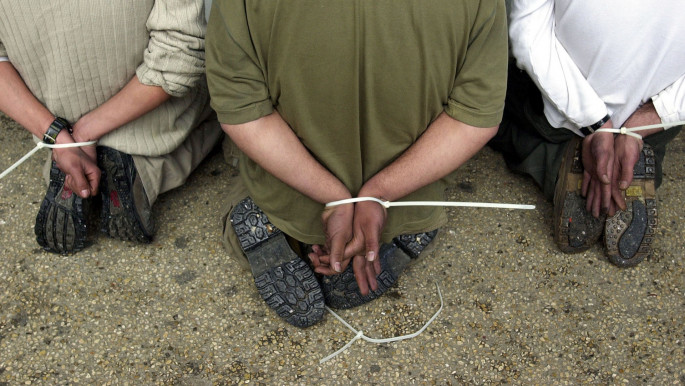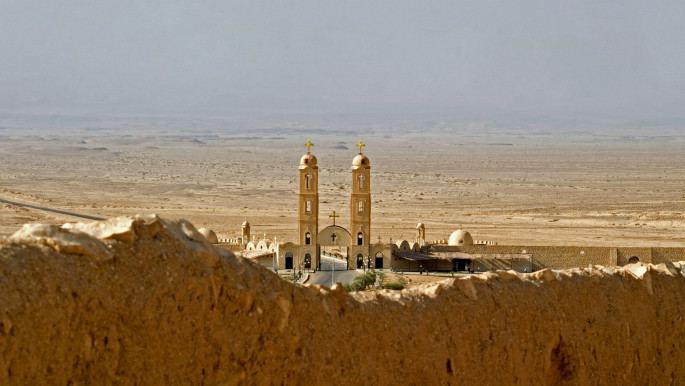Egypt's relentless war on journalism persists amid pandemic
The editor was apprehended outside Tora prison, south of Cairo, while interviewing Laila Soueif, the mother of jailed prominent activist Alaa Abdel Fattah. She was released on bail hours later. The reason behind the arrest and the charges against her were unclear.
Her brief detention was a highly symbolic example of the Egyptian government's campaign of persecution against independent journalism.
"Disturbing news of the arrest of Egyptian journalist Lina Attalah simply for doing her job. @Linaattalah is one of the country's most highly respected journalists. Her arrest is yet another blow to press freedoms under the Sisi regime," Sudarsan Raghavan, Cairo bureau chief for the Washington Post, tweeted on the day of her arrest.
One of the country's last remaining independent news outlets, Mada Masr and its staff have been repeatedly attacked under the rule of President Abdel Fattah al-Sisi.
Last November, security forces raided its offices and briefly detained four of its journalists, including Attalah, shortly after the news site published an investigative piece about Sisi's oldest son. It is one of over 500 websites blocked by the government in recent years.
 |
The Egyptian government continues to brazenly violate press freedom by arresting journalists, raiding media outlets and blocking news websites to stifle criticism |  |
Attalah was the fifth journalist to be detained in Egypt in less than ten days after the detention of Moataz Wednan, Mostafa Al-Aasar, Haitham Hasan Mahgoub and Sameh Hanin, according to media watchdog group Reporters Without Borders (RSF). Some of them were charged with publishing "false news" that threatens national security, while others were accused of belonging to and supporting a "terrorist group".
"The Egyptian government continues to brazenly violate press freedom by arresting journalists, raiding media outlets and blocking news websites to stifle criticism, while the international community has turned a blind eye to the harassment of journalists in the country," the International Press Institute (IPI)'s director of advocacy, Ravi R Prasad, said in reaction to Mahgoub's arrest.
An Egyptian reporter who uses the pseudonym Youssef Salah stressed that the state crackdown is part of a well-planned agenda to silence critical voices, tighten its grip on independent media "to intercept" any narratives different from the official one, and impede the public from making informed decisions about what is happening around them.
 |
|
| Read more: Death no. 1005: Shady Habash |
"We are witnessing one of the worst periods in the journalism field. It's like walking on hot coals,"Salah told The New Arab. "I always feel I will be arrested someday, and I won't know the reason for it". A number of local journalists have moved outside Egypt to be able to do their job, he said, with some of them unable to return to their homeland for fear of imprisonment.
Justin Shilad, Senior Middle East and North Africa Researcher at the Committee to Protect Journalists (CPJ), noted that with an increasingly restricted space for press freedom, doing journalism in Egypt can be a constant "cat-and-mouse game" trying to figure out what subjects may draw the most negative scrutiny from officials.
"The red lines keep changing from day to day, it's hard to predict what kind of coverage and stories can take you to prison," Shilad told The New Arab.
The Arab Network for Human Rights Information (ANHRI) reported at least ten journalists had been arrested by Egyptian authorities between 18 March, when the novel coronavirus was officially announced in the country, and 18 May.
"The health conditions in Egyptian prisons have deteriorated, and inmates are not receiving necessary health care especially those who suffer from chronic diseases," the network said making reference to Shady Habash, an Egyptian filmmaker detained for two years without trial who died suddenly this month.
Egypt's authorities have been accused of using the Covid-19 pandemic to clamp down on the press, with dozens of journalists punished by means of censorship, intimidation and arrest.
 |
Egypt's authorities have been accused of using the Covid-19 pandemic to clamp down on the press, with dozens of journalists punished by means of censorship, intimidation and arrest |  |
Over a dozen people have been detained or hit with high fines over social media posts or reporting about the outbreak, according to Amnesty International.
In March, The Guardian's Cairo correspondent was forced to leave the country after authorities revoked her press accreditation over an article that cited a scientific study suggesting the coronavirus infection rate may be higher than officially reported.
Last week, Shayma Samy, a journalist who had recently written for a news outlet run by a socialist opposition party, was taken by police from her home in Alexandria. She was the second female reporter to be arrested within a week after Mada Masr's chief editor. Her whereabouts and the reason for her detention are still unknown.
Last month, authorities blocked a local news site that covered calls by activists to release political prisoners over fears of the coronavirus spreading in in the overcrowded cells.
 |
|
| Read more: Middle East regimes are freeing inmates as coronavirus spreads. But political prisoners remain behind bars |
Earlier this month, the Egyptian Supreme Council for Media Regulation banned journalists and contributors to any media outlet from publishing content under pseudonyms without written approval of the state.
The decision came weeks after the council levied a 250,000 Egyptian pound ($16,000) fine on private newspaper Al-Masry Al-Youm over a series of articles on the Sinai Peninsula. The three editorial articles backed a proposal to isolate Sinai from Egypt and allow it to choose its ruler as a free industrial zone that is not subject to Egyptian laws.
The ban was added to a list of press regulations issued by the media council in September 2019, which included not publishing news deemed harmful to the country's public and religious interests, or any matter that provokes or incites citizens in a way that threatens national or economic security.
A set of rules media workers viewed as a violation of the freedom of the press and an inappropriate interference in their work. Ahmed Safir, an Egyptian journalist who did not want his real name to be used, emphasised that the recent regulations do not add anything new to the already restrictive media environment where the majority of news outlets are state-owned.
 |
Journalism in Egypt has effectively become a crime over the past four years, as authorities clamp down on media outlets and muzzle dissent |  |
"Working is becoming more difficult by the day. I fear for my safety, that of my family and people around me," he said. "I worry about my sources, I don't want to harm anyone with a story".
Safir explained that Egyptians are terrified to talk as phones are tapped, and when they agree to speak they ask to meet face-to-face which is often hard to arrange due to security concerns. Digging up information, he continued, is very difficult as officials will not answer phone calls or reply to e-mails even for basic inquiries on non-sensitive subjects.
Egypt has been witnessing a crackdown and restrictions on press freedoms and civil liberties since Sisi's rise to power in 2013. The repressive campaign culminated with a wave of arrests of opponents and journalists following the rare anti-Sisi protests that erupted last September.
 |
|
| Read more: Saviour or dictator: Copts in Sisi's Egypt trapped by a strongman's balancing act |
Ranking 166 out of 180 countries for press freedom, Egypt is one of the world's top jailers of journalists. In most cases, media professionals face charges related to joining a terrorist group and publishing fabricated news that threatens national security.
According to CPJ, Egypt is the world's leading jailer of reporters on "fake news" charges. At the beginning of December 2019, it was detaining at least 21 journalists out of 30 incarcerated worldwide on these charges.
Amnesty documented 37 cases of journalists held in Egypt's jails. Several among them have not been charged and their detention has been extended again and again.
The country's prison conditions are often described as deplorable, raising fears of coronavirus spreading in overcrowded and unsanitary jails amid the ongoing outbreak.
Journalism in Egypt has effectively become a crime over the past four years, as authorities clamp down on media outlets and muzzle dissent, the human rights group said in a report released in early May.
 |
The red lines keep changing from day to day, it's hard to predict what kind of coverage and stories can take you to prison |  |
With the number of infected cases in Egypt continuing to rise, rights groups claim the government is tightening its control over information.
From the onset of the public health crisis, in response to the grave threat posed to the health of prisoner populations, CPJ launched its global #FreeThePress campaign, joined by more than 190 groups, calling for the release of all journalists imprisoned for their work.
"We've seen authorities across the region releasing numbers of prisoners including journalist detainees. It's surprising to see Egypt going the opposite way, adding more reporters to its imprisoned population," CPJ's MENA researcher said.
Follow us on Facebook, Twitter and Instagram to stay connected





 Follow the Middle East's top stories in English at The New Arab on Google News
Follow the Middle East's top stories in English at The New Arab on Google News


